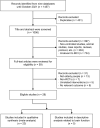The Comparative Effectiveness of Traditional Chinese Medicine Exercise Therapies in Elderly People With Mild Cognitive Impairment: A Systematic Review and Network Meta-Analysis
- PMID: 35370918
- PMCID: PMC8966650
- DOI: 10.3389/fneur.2022.775190
The Comparative Effectiveness of Traditional Chinese Medicine Exercise Therapies in Elderly People With Mild Cognitive Impairment: A Systematic Review and Network Meta-Analysis
Abstract
Background: Mild cognitive impairment (MCI) in the elderly is a health problem worldwide. Studies have confirmed that traditional Chinese medicine (TCM) exercise therapies can improve MCI. However, which therapy is the best and their impacts on brain function remain controversial and uncertain. This study aims to compare and rank TCM exercise therapies for MCI in the elderly, and analyze their effects on brain function, in order to find an optimal intervention and provide a basis for clinical treatments decision-making.
Methods: The Web of Science, PubMed, EMBASE, Cochrane Central Register of Controlled Trials, Clinical Trials, China National Knowledge Infrastructure (CNKI), Wangfang database, China Science and Technology Journal Database, and Chinese Biomedical Medicine (CBM) were searched through October 28, 2021. Two researchers reviewed all the studies and extracted the data. The ADDIS software version 1.16.8 and the Bayesian hierarchical model were used for pair-wise meta-analysis and network meta-analysis, and the STATA software version 14.0 was used to draw the network evidence plots and funnel plots.
Results: A total of 23 studies on 2282 participants were included in this study. In the pair-wise meta-analysis, TCM exercise therapies (Baduanjin exercise, Tai Chi, Liuzijue exercise and finger exercise) were superior to non-TCM exercise therapies (stretching and toning exercise, usual care, health education and routine daily activities) in terms of MMSE, MoCA and ADL outcomes. In the network meta-analysis, the MMSE outcome ranked Baduanjin exercise (78%) as the best intervention and Tai Chi (36%) as the second. The MoCA outcome ranked Baduanjin exercise (62%) as the best intervention. For the ADL outcome, Baduanjin exercise (60%) ranked the best, and followed by finger exercise (43%).
Conclusion: TCM exercise therapies may improve the cognitive function in elderly patients with MCI. Among the four therapies included, the Baduanjin exercise may be the preferred therapy for MCI in the elderly, and its mechanism may be related to the regulation of cognitive-related brain function and structure.
Systematic review registration: https://inplasy.com, identifier: INPLASY202070006.
Keywords: brain function; exercise therapy; mild cognitive impairment; network meta-analysis; traditional Chinese medicine.
Copyright © 2022 Su, Yuan, Liu, Luo, Li, Liu and Feng.
Conflict of interest statement
The authors declare that the research was conducted in the absence of any commercial or financial relationships that could be construed as a potential conflict of interest.
Figures




Similar articles
-
Comparative efficacy of 5 non-pharmacological therapies for adults with post-stroke cognitive impairment: A Bayesian network analysis based on 55 randomized controlled trials.Front Neurol. 2022 Sep 28;13:977518. doi: 10.3389/fneur.2022.977518. eCollection 2022. Front Neurol. 2022. PMID: 36247793 Free PMC article.
-
Exploring the efficacy of traditional Chinese medicine exercise in alleviating anxiety and depression in older adults: a comprehensive study with randomized controlled trial and network meta-analysis.Front Psychol. 2023 Dec 11;14:1290471. doi: 10.3389/fpsyg.2023.1290471. eCollection 2023. Front Psychol. 2023. PMID: 38146395 Free PMC article.
-
Comparative efficacy and safety of multiple acupuncture therapies for post stroke cognitive impairment: a network meta-analysis of randomized controlled trials.Front Neurol. 2023 Aug 10;14:1218095. doi: 10.3389/fneur.2023.1218095. eCollection 2023. Front Neurol. 2023. PMID: 37638181 Free PMC article.
-
Effectiveness of traditional chinese medicine (TCM) exercise therapy intervention on the cognitive function in the elderly: A systematic review and meta-analysis.Geriatr Nurs. 2024 Jul-Aug;58:352-360. doi: 10.1016/j.gerinurse.2024.06.001. Epub 2024 Jun 14. Geriatr Nurs. 2024. PMID: 38878735
-
Effect of a Baduanjin intervention on the risk of falls in the elderly individuals with mild cognitive impairment: a study protocol for a randomized controlled trial.BMC Complement Med Ther. 2023 Jul 13;23(1):233. doi: 10.1186/s12906-023-04050-4. BMC Complement Med Ther. 2023. PMID: 37442990 Free PMC article.
Cited by
-
Comparative efficacy of 5 non-pharmacological therapies for adults with post-stroke cognitive impairment: A Bayesian network analysis based on 55 randomized controlled trials.Front Neurol. 2022 Sep 28;13:977518. doi: 10.3389/fneur.2022.977518. eCollection 2022. Front Neurol. 2022. PMID: 36247793 Free PMC article.
-
The effects of mind-body exercise on anxiety and depression in older adults: a systematic review and network meta-analysis.Front Psychiatry. 2024 Feb 7;15:1305295. doi: 10.3389/fpsyt.2024.1305295. eCollection 2024. Front Psychiatry. 2024. PMID: 38384592 Free PMC article.
-
Topical Cellular/Tissue and Molecular Aspects Regarding Nonpharmacological Interventions in Alzheimer's Disease-A Systematic Review.Int J Mol Sci. 2023 Nov 20;24(22):16533. doi: 10.3390/ijms242216533. Int J Mol Sci. 2023. PMID: 38003723 Free PMC article.
-
A Study on the Effect of Traditional Chinese Exercise Combined With Rhythm Training on the Intervention of Older Adults With Mild Cognitive Impairment.Am J Alzheimers Dis Other Demen. 2023 Jan-Dec;38:15333175231190626. doi: 10.1177/15333175231190626. Am J Alzheimers Dis Other Demen. 2023. PMID: 37489602 Free PMC article. Clinical Trial.
-
Effects of exercise therapy on patients with poststroke cognitive impairment: A systematic review and meta-analysis.Front Neurosci. 2023 Apr 6;17:1164192. doi: 10.3389/fnins.2023.1164192. eCollection 2023. Front Neurosci. 2023. PMID: 37090811 Free PMC article.
References
-
- Li B, Zhang W. Trend of population aging in China and the strategy. China Popul Today. (1998) 15:2–4. - PubMed
Publication types
LinkOut - more resources
Full Text Sources

